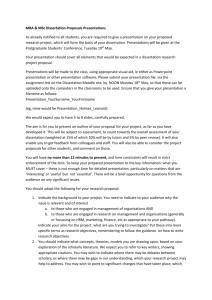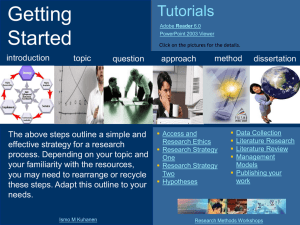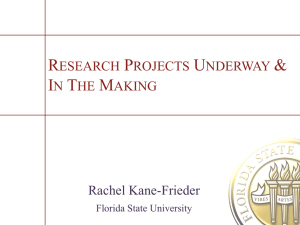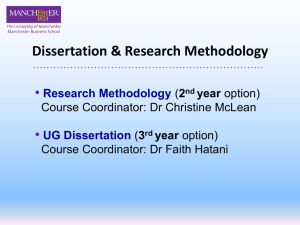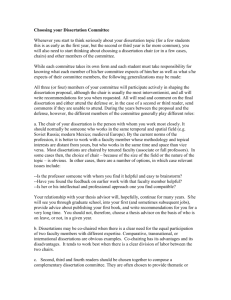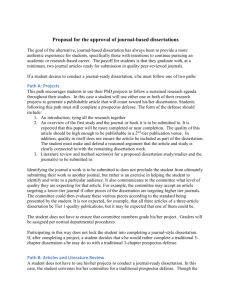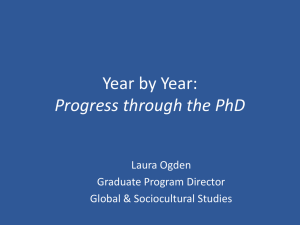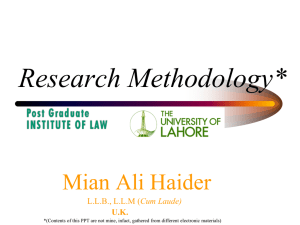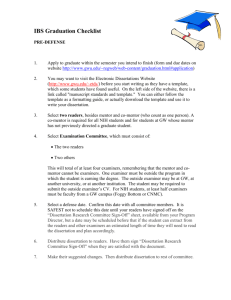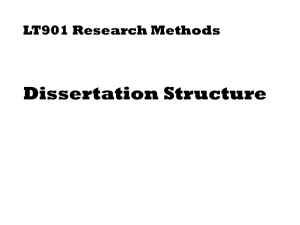MSc Economics Dissertation Department of Economics Mathematics
advertisement
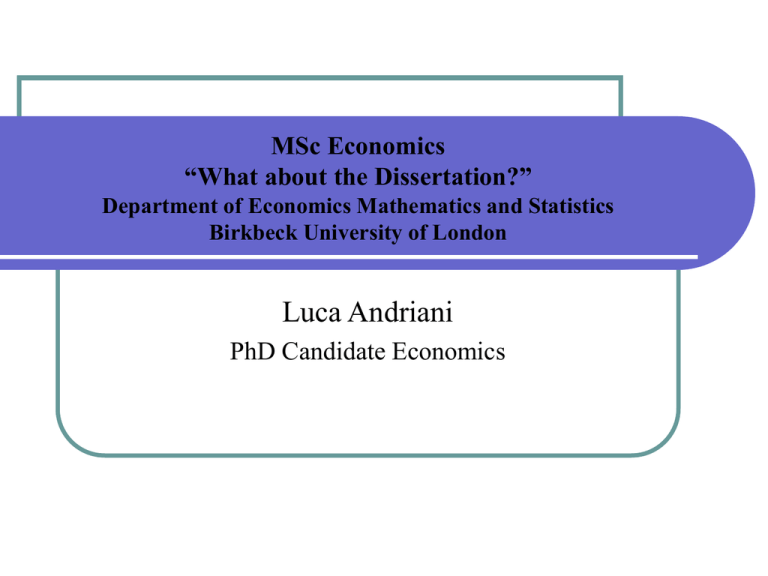
MSc Economics “What about the Dissertation?” Department of Economics Mathematics and Statistics Birkbeck University of London Luca Andriani PhD Candidate Economics Key Information: Deadlines Proposal deadline 3rd May 2011 After proposal Proposal can be modified only in exceptional cases (lack of data, new data set or very innovative approach to the topic) Submission deadline 30th September 2011 Point of Contact (P.O.I) Key Information: P.O.C and not only Communication better before the end of June (July and August?) The student can ask material and suggestions to the P.O.C (papers, useful links, data?) The student can ask material and suggestions to other members of the department including PhD students (papers, useful links, data?) From the Handbook The dissertation is an INDEPENDENT work Set a question about a specific topic (Interesting question: new way or/and new data) Good knowledge of the relevant literature Good understanding and application of techniques (only critical survey is not enough!) From the Handbook Good presentation of the work problems with the written English no page numbers abstract missing the discussion is not focussed: a paragraph is often followed by another that contradicts it From the Handbook Good presentation of the work spends too long on unit root testing (7 pages) Repeat the same exercise three times and reports them separately. These should have been aggregated into one section Not enough literature review to be a good dissertation From the Handbook Data and analysis replication examiners have to be able to replicate the exercises developed in the dissertation entire data set required confidentiality issue Choosing a Topic Your interests Employers’ interests P.O.C interests Data and research material Your Interests What did capture more your interests during the master course? What are you planning to learn? Methodology Software Employers’ Interests Dissertation on your CV Interesting title Skills and abilities acquired during the dissertation (confidence in applying some econometric technique, ability in data manipulation etc…) Interesting topic to discuss during an interview P.O.C Interests Read the staff web page Your topic might match the interests of one or more members of the Department Talk to several members of the Department (It is not rude!) PhD students might help as well (suggestions, hints etc…) Dissertation is a good route into a PhD… Data and Research Material Birkbeck e-Library JSTOR ScienceDirect Google Scholar DO NOT OVER-READ!!!!! General Structure of Dissertation Abstract Introduction Literature review Data summary and description Methodology and econometric technique Results of analysis Conclusions Abstract Very difficult!!! In 100-200 words you have to explain: the importance of the question of the dissertation the methodology and the data you have used the results of the analysis Abstract: “Social Norms and Community Enforcement” Kandori 1991 (Game Theory) Abstract: “Credit Cycles” Kiyotaki and Moore 1997 (Credit Market Imperfections) Introduction IT IS NOT A LITERATURE REVIEW!!!! Show that the paper is related to something interesting Ex 1. Y matters: when Y rises or falls people are hurt or helped Ex 2. Y is controversial: some argue one thing while other say another Question: tell the reader what the paper actually does Compare this paper with prior works and explain the differences Introduction List two or three potential contributions of your work Road map of your work: explain the structure of your paper Section 2 introduces the formal model of public game Section 3 shows regression results on the relationship between corruption and decentralisation using country level data Section 4… Section 5 concludes the paper Literature Review No chronological way!!!! Less than 50% of your entire paper Less than 50% of your efforts (try not to focus most of your work on reading papers and summarise them) Classical papers are very welcome but do not forget most recent papers as well!! Data Good and accurate descriptive analysis Descriptive statistics might help to interpret the econometric results and to develop final recommendations Econometric analysis Underline the results on line with the theoretical framework BUT Focus on original findings It is not the Econometric project so do not spend 6-7 pages on explaining the technical procedures adopted for unit root Make tests and mention them but in a concise way Conclusions Not Just what you did!! You should put in context of the literature you have mentioned (literature review) the value added of your results Possible extension of your work in the future? Keep in Mind!!!! Dissertation is full of constraints (time, resources, data, personal ability, learning process) Start as soon as possible! Data = topic (especially for empirical works) Play with your data as soon as you can (problems are behind the corner: incompatible series, unexpected gaps etc… These problems cannot be solved the last few days) Keep in Mind!!!! Make the P.O.C part of your academic life as soon as you can The P.O.C will not correct the draft of your dissertation but he/she will provide useful suggestions Use the papers as your template Some Useful References Hamermesh D “How to Publish in a Top Journal (I wish that I knew!)” https://webspace.utexas.edu/hamermes/www/HowtoPublish.pdf Smith, W www.commoditymodels.com “How to choose a Dissertation Topic” http://www.ems.bbk.ac.uk/faculty/phdStudents/smith/presentations/dissert_f “The Introduction Formula” http://strategy.sauder.ubc.ca/head/brander.htm Finally! Good Luck!!

